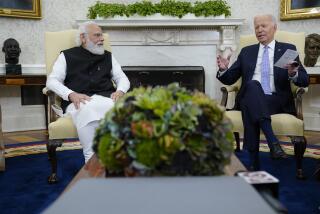Democracy Spreads, But Not the Rule of Law
- Share via
WASHINGTON — Vice President Al Gore won praise for his criticism of Malaysia’s human-rights record at a businessmen’s banquet before last month’s Asia-Pacific Economic Cooperation summit in Kuala Lumpur. But if Gore’s remarks helped him at home, they caused confusion among conference participants, who thought his comments inappropriate.
One problem was that Gore mixed his messages and examples. He cited the maxim that democracies have done better at overcoming economic crises than “nations where freedom is suppressed,” because “democracy confers legitimacy that reforms must have to be effective.” To buttress his point, he pointed to “people power” in the Philippines, do moi in Vietnam and reformasi, a slogan shouted in the streets of Malaysia and Indonesia even as he spoke.
But do moi was a government-initiated economic renewal plan that only partly opened the country’s markets. It can hardly be compared to the Philippine movement that ousted a dictator and restored democracy. Furthermore, Prime Minister Mahathir Mohamad, the real target of Gore’s criticism, is a far cry from the corrupt and tyrannical Ferdinand E. Marcos of the Philippines. Gore came perilously close to putting Washington in the awkward position of advocating a change of government through street protests when he expressed admiration for the demonstrators protesting Mahathir’s treatment of a political luminary.
Because the United States is often seen in East Asia as pushing its own agenda, Gore may have rallied support for Mahathir. In fact, Malaysia carries out a number of democratic practices. Mahathir must work skillfully to stay on top of disparate factions within the country’s longtime ruling political organization; Kelantan state is run by one opposition party, Penang by another. Until Mahathir’s ouster of Deputy Prime Minister Anwar Ibrahim, the press was restrained largely through self-censorship.
Rather than encourage demonstrators, Gore should have focused on the importance of the rule of law in the region. Mahathir’s recent actions have thrust this issue onto the world’s center stage.
The prime minister disagreed with Anwar’s economic proposals for ending Malaysia’s crisis and cleansing the country of corruption, so Mahathir sacked him, an act well within his rights. But he then accused Anwar of sexual and financial misbehavior. When Anwar objected, Mahathir ordered him jailed, where he was beaten. Mahathir’s use of the country’s Internal Security Act, a holdover from the struggle against communist guerrillas, to punish Anwar struck most observers as flagrantly violating his universally recognized human rights.
Gore would have been wiser to object to this crude treatment of a widely respected senior political leader by relating his criticism to international efforts to revitalize the rule of law, a concept perhaps more important to economic recovery than stoking democratic fires. Before the Asian financial crisis hit, Mahathir had led his country to a remarkable level of prosperity and social equality. But during his 17-year watch, the rule of law in his country has deteriorated. Malaysia’s judiciary has largely lost its independence.
Corruption and lack of trust in government are among the deepest worries of the intelligentsia in China, Indonesia, Korea, Thailand, Malaysia and Japan, according to interviews I conducted. Respondents expressed a strong desire to see people treated more fairly and justly, according to rules all must follow, no matter how wealthy or well-connected they are.
If Gore had pushed for greater international acceptance of the rule of law, he could have praised China for signing the U.N. International Covenant on Economic, Social and Cultural Rights last year and the similar Covenant on Civil and Political Rights last October. In signing the pacts, China joined Japan, Korea and the Philippines and, on one agreement, Thailand. But Malaysia, Singapore and Indonesia have not yet signed. (Gore would have been obliged to note that ratification of the first of these is stuck in Congress.) One can hope that Malaysia will eventually sign the covenants, which embody strong support for human rights relating to arbitrary arrest and detention, treatment of prisoners and hearings before independent and impartial tribunals.
Partly because of these kinds of covenants, political institutions in much of East Asia are gradually becoming freer. Although differences between Asian and American values have been exaggerated by some Asians to justify their own authoritarian rule, there remain key differences. By recognizing them, one can better understand why approaches to democracy and social order vary.
“Respect for authority” is one of the most “critically important” of 14 societal values among Malaysians, according to the interviews. “Personal freedom” is at the bottom of their and Singaporeans’ concerns. In Malaysia, China and Singapore, the most critically important value is “orderly society.” Memories of violence spawned by racial or religious differences in Malaysia, Indonesia and Singapore may account for this preference and still affect attitudes toward street demonstrations.
Public acceptance of painful economic reforms is gradually taking hold in all the threatened East Asian countries. But there can be little hope of gaining genuine democratic support in countries like Malaysia, Indonesia and China without strengthening the rule of law. Progress toward fairness and justice will be difficult if world leaders don’t strongly criticize the kinds of actions that Mahathir has taken against his onetime political heir.
Democracy will grow stronger as economies develop, though the process will take time. But the public’s attention now should be directed at one man’s shocking inhumanity to another and at the need to respect the rule of law, not at democratizing countries. Many will conclude that the brilliant record of an unusually gifted Malaysian prime minister has been indelibly blackened. How unnecessary. What a tragedy. *
More to Read
Sign up for Essential California
The most important California stories and recommendations in your inbox every morning.
You may occasionally receive promotional content from the Los Angeles Times.










